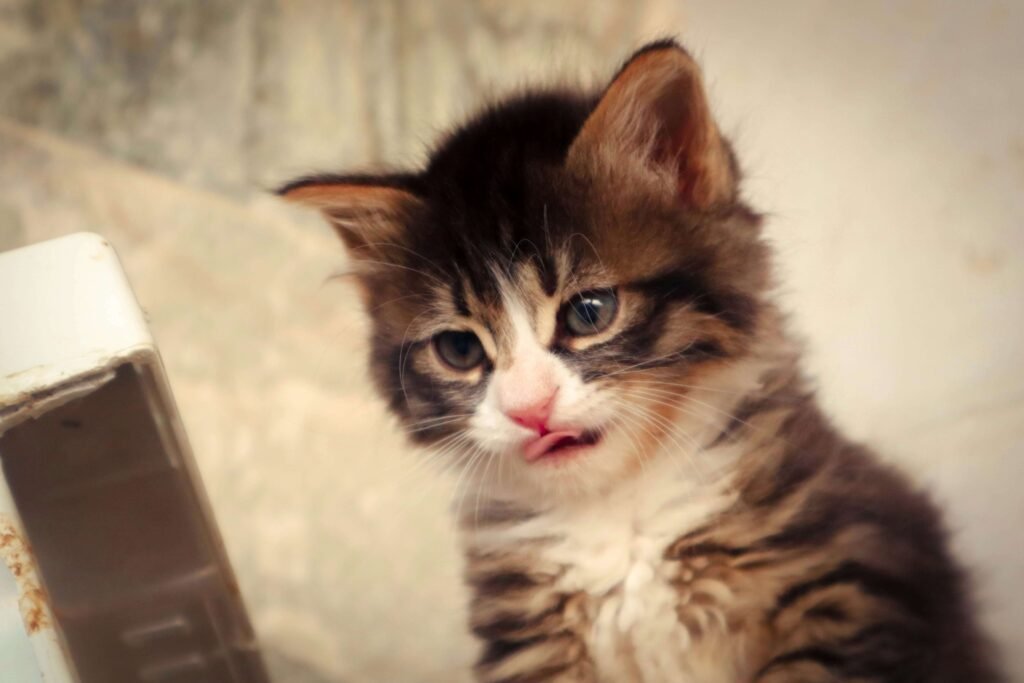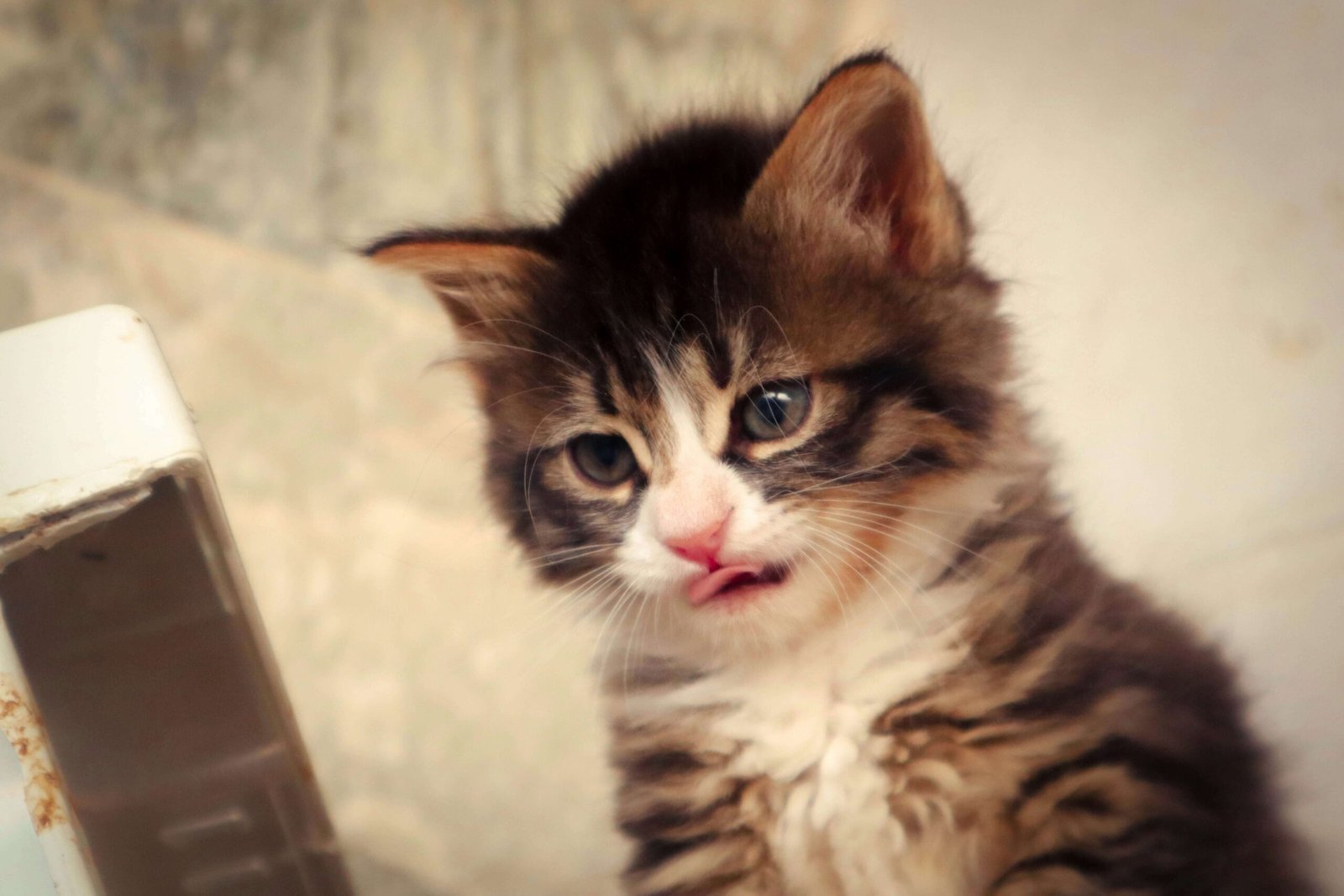Why Does My Cat Lick My Head? Unraveling the Mystery
Cats are known for their quirky and sometimes puzzling behaviors, and one of the most intriguing is when they lick their humans—especially on the head. If you’ve ever found yourself wondering why your feline friend engages in this unusual habit, you’re not alone. Cat owners around the world have scratched their heads (pun intended) trying to understand what drives this behavior. Is it a sign of affection, curiosity, or something else entirely? In this blog post, we’ll explore the reasons behind this unique behavior, decode what your cat might be trying to tell you, and provide tips on how to respond.
The Meaning Behind the Licks: Why Cats Lick Their Humans
When your cat licks your head, it’s more than just a random act—it’s a form of communication rooted in their instincts and social behaviors. Here are some possible explanations for this behavior:
Bonding and Affection : Licking is a way cats show love and strengthen their bond with those they trust. By licking your head, your cat may be treating you as part of their “family.”
Territorial Marking : Cats use scent glands in their mouths to mark their territory. Licking your head could be their way of claiming you as their own.
Grooming Instincts : Cats are natural groomers, and licking is a deeply ingrained behavior. They may see you as part of their grooming routine, especially if your hair smells interesting to them.
Curiosity About Scents : Your head often carries unique scents from hair products, sweat, or even food. Cats are drawn to these smells and may lick to investigate further.
Comfort and Habit : Some cats lick because it reminds them of kittenhood when their mother would groom them. It’s a comforting and familiar action.
Understanding these motivations can help you appreciate your cat’s behavior and respond in a way that reinforces your bond.
Decoding the Behavior: What Your Cat Might Be Thinking
While licking your head might seem odd, it’s important to consider your cat’s perspective. Here are some insights into what might be going through their mind during this behavior:
“You’re Part of My Group” : Cats often groom each other within their social group. If your cat licks your head, they might see you as a fellow “cat” in their circle.
“Your Hair Smells Interesting” : Cats are highly sensitive to scents, and your hair might carry odors that intrigue them, prompting them to lick.
“I Want to Show You Love” : For some cats, licking is their primary way of expressing affection. Your head might simply be the most accessible spot.
“I’m Feeling Stressed” : Over-grooming or excessive licking can sometimes indicate stress or anxiety. If your cat seems overly focused on licking, it might be worth investigating potential triggers.
“It’s Just Fun!” : Some cats enjoy the texture or taste of human hair, making licking a playful activity rather than a meaningful gesture.
By observing your cat’s overall demeanor and body language, you can better interpret whether their licking is a sign of affection, curiosity, or something else entirely.
Check this guide 👉Why Does My Cat Lick Me and Not My Husband? Best 7 Tips!
Check this guide 👉Why Is My Cat Licking My Blanket? Best 7 Behavior Tips!
Check this guide 👉Why Does My Cat Lick My Hair? Best 7 Expert Care Tips!

Possible Reason for Licking | What It Means |
|---|---|
Bonding and Affection | Your cat sees you as family and wants to show love. |
Territorial Marking | Your cat is claiming you as their own through scent. |
Grooming Instincts | Your cat is following their natural grooming habits. |
Curiosity About Scents | Your hair or scalp has an interesting smell to them. |
Comfort and Habit | Licking reminds them of kittenhood and feels soothing. |
How to Respond: Tips for Managing Head-Licking Behavior
If your cat’s head-licking habit is endearing, you might not want to discourage it. However, if it becomes excessive or uncomfortable, there are ways to manage it. Here are some tips to consider:
Redirect Their Attention : Offer a toy or engage your cat in play to distract them from licking. This can help redirect their energy toward something more appropriate.
Use Positive Reinforcement : Reward your cat with treats or praise when they refrain from licking your head. This encourages them to focus on other behaviors.
Check for Stress Triggers : Observe your cat’s environment for potential stressors, such as loud noises or changes in routine, that might be causing anxiety.
Limit Access to Your Head : If the behavior bothers you, try wearing a hat or tying your hair back to make your head less appealing.
Consult a Veterinarian : If the licking seems compulsive or obsessive, consult your vet to rule out underlying health issues or behavioral problems.
With patience and consistency, you can guide your cat toward healthier habits while maintaining a strong bond.
Strengthening Your Relationship Through Understanding
Building a deeper connection with your cat starts with understanding their behaviors and responding appropriately. Here are some ways to nurture your relationship while addressing head-licking tendencies:
Spend Quality Time Together : Engage in activities your cat enjoys, such as playing, petting, or simply sitting nearby. This strengthens your bond and reduces unwanted behaviors.
Learn Their Preferences : Pay attention to what your cat likes and dislikes. For example, some cats prefer being petted on the head rather than licked.
Respect Their Boundaries : While it’s important to set limits, ensure you do so gently to avoid damaging your relationship.
Provide Mental Stimulation : Boredom can lead to unusual behaviors. Puzzle toys or interactive games can keep your cat entertained and reduce excessive licking.
Celebrate Their Unique Personality : Every cat is different, and embracing their quirks makes your relationship more rewarding.
By focusing on mutual respect and understanding, you can create a harmonious and loving environment for both you and your cat.
Understanding Feline Grooming Habits
Cats are meticulous groomers, and their licking behavior extends beyond just cleaning themselves. Here’s a closer look at why grooming is such an integral part of their lives:
Self-Cleaning : Cats lick their fur to remove dirt, loose hair, and parasites, keeping their coat healthy and shiny.
Temperature Regulation : Licking helps distribute natural oils across their fur, which can insulate them against cold or cool them down in warm weather.
Stress Relief : Grooming has a calming effect on cats, similar to how humans might find comfort in repetitive actions like knitting or pacing.
Social Bonding : In multi-cat households, mutual grooming (allogrooming) strengthens relationships and establishes trust among feline companions.
Marking Territory : Saliva contains scent markers that help cats claim ownership of their environment—or their favorite human.
Understanding these habits sheds light on why your cat might extend their grooming rituals to you, including licking your head as a sign of care or ownership.
Signs Your Cat Feels Secure Around You
When your cat licks your head, it often indicates they feel safe and secure in your presence. Here are some other signs that show your cat trusts you:
Purring in Your Presence : Purring is a universal sign of contentment and relaxation, especially when directed toward you.
Kneading on Your Lap : This kitten-like behavior signifies trust and comfort, often accompanied by purring.
Exposing Their Belly : While not always an invitation for petting, showing their belly is a vulnerable act that reflects deep trust.
Following You Around : Cats are naturally independent, so if yours shadows your every move, it’s a clear sign they enjoy your company.
Sleeping Near You : Cats value their sleep, so choosing to nap close to you is a huge compliment and a sign of security.
These behaviors highlight the strength of your bond and reinforce the idea that your cat sees you as a source of safety and affection.
Managing Unwanted Licking Behavior
While head-licking can be endearing, it’s not always desirable. If you’d like to discourage this behavior, here are some practical strategies to consider:
Provide Alternatives : Offer soft toys or blankets that mimic the texture of your hair to redirect their licking urges.
Use Distraction Techniques : Clap your hands or make a gentle noise to interrupt the behavior without startling your cat.
Adjust Your Routine : Wash your hair less frequently or switch to unscented products to reduce scents that might attract your cat.
Set Boundaries : Gently move your cat away when they start licking and consistently enforce limits to teach them what’s acceptable.
Reward Good Behavior : Use treats or praise to reinforce moments when your cat refrains from licking your head.
By implementing these strategies with patience and consistency, you can guide your cat toward healthier habits while maintaining a loving relationship.
Frequently Asked Questions About Cats Licking Heads
Why does my cat only lick my head and not other parts of my body?
Your head might be the most accessible or interesting spot due to its scent or texture.
Is it normal for my cat to lick me excessively?
Occasional licking is normal, but excessive licking could indicate stress, boredom, or a medical issue.
Should I stop my cat from licking my head?
If it doesn’t bother you, it’s fine to let them continue. If it does, gently redirect their attention to something else.
Can my cat’s licking cause skin irritation?
While rare, frequent licking can irritate sensitive skin. Monitor for redness or discomfort and take steps to minimize the behavior if needed.
Does my cat think I’m another cat when they lick me?
Not necessarily, but they might see you as part of their social group and express affection accordingly.
Embracing the Quirks of Feline Companionship
Cats bring endless joy and mystery into our lives, and their unique behaviors—like licking our heads—are just one of the many ways they express themselves. While it might seem strange at first, understanding the reasons behind this behavior can deepen your appreciation for your feline companion. Whether it’s a sign of affection, curiosity, or comfort, your cat’s actions are a testament to the special bond you share. So, the next time your cat decides to give your head a little lick, remember that it’s their way of saying, “You’re mine, and I love you.” Embrace these moments, cherish the connection, and celebrate the wonderful quirks that make life with cats so rewarding.
Dog Tapeworm Life Cycle: Best 7 Expert Tips! – Learn how tapeworms infect dogs, spot symptoms, and break the cycle with expert prevention strategies.
Anxious Cat Body Language: Best 7 Expert Tips! – Learn to spot signs of stress, understand triggers, and help your cat feel safe and relaxed.
Anxious Dog Body Language: Best 7 Expert Tips! – Learn to spot signs of anxiety, respond effectively, and help your dog feel safe and secure.
Is Breeding Dogs Bad? Best 7 Expert Tips! – Explore the ethics, benefits, and risks of dog breeding to make informed decisions for a better future.





